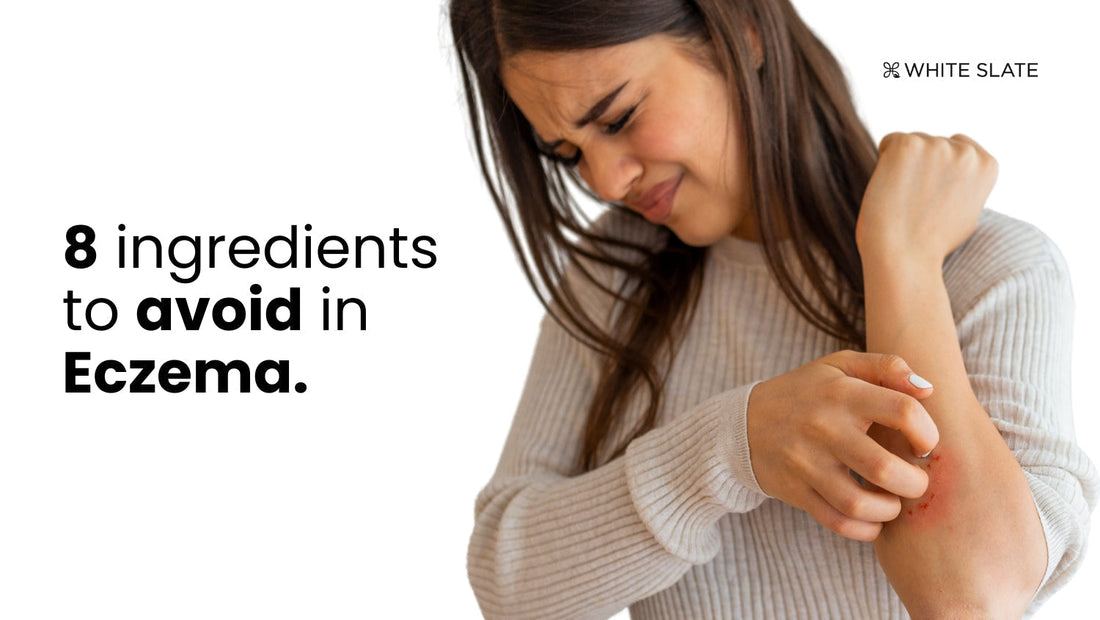Having eczema is like living with a chronic itch that you have to scratch, and never knowing when painful flare-ups will hit. Climate, stress, and allergies are important considerations, but there's one huge factor that gets overlooked—the ingredients in your skincare products. If you have eczema, it's just as important to know what to avoid as what to use.
Today we are discussing eight of the most common ingredients to avoid, why they irritate eczema-friendly skin, and how to establish a routine to heal and balance.
Understanding What Eczema Is
Eczema, or atopic dermatitis, is a chronic skin disorder that dries, itches, swells, and inflames the skin. It is triggered by a compromise in the skin's barrier function, allowing for loss of moisture and entry of irritants. As a result, even momentary exposure to harsh chemicals can trigger redness, flaking, or burning rashes.
There are different types of eczema, but they all require one thing: the right and loving skincare routine.
The Relationship Between Triggers and Eczema
Eczema breakouts are most often the result of external causes. These may include seasonal weather changes, allergens, irritating products, or emotional stress. Yet, skin care products with harsh or sensitive ingredients can also be damaging.
Individuals with eczema have sensitive skin, so what works well for others may still cause their skin to feel uneasy, dry, or burn.
8 Skincare Ingredients to Avoid with Eczema
- Fragrance (Perfume) – Among the most common allergenic triggers of skin reactions. Both synthetic and natural fragrances can weaken the skin barrier and cause inflammation. Use fragrance-free products, especially during flare-ups.
- Denatured Alcohol, Ethanol, Alcohol – Found in toners and gels. They strip away natural oils, worsening dryness and irritation. Avoid products listing alcohol high on the ingredients list.
- Sodium Lauryl Sulfate (SLS) – A foaming agent in cleansers and shampoos that is too harsh for sensitive skin. It removes protective oils and worsens eczema.
- Essential Oils (Tea Tree, Peppermint, Eucalyptus) – Though natural, they are too strong for eczema-prone skin and can inflame or irritate if applied directly.
- Artificial Dyes – Used for appearance only, but can irritate sensitive or eczema-prone skin.
- Lanolin – Derived from wool and used as a humectant. Some with eczema are allergic to it, especially around the lips and eyes.
- Urea – In high concentrations, it can sting and burn sensitive skin, worsening eczema irritation.
- Preservatives (Methylisothiazolinone / Methylchloroisothiazolinone) – Common in wipes, cleansers, and shampoos. These can trigger allergic reactions and rashes.
How to Get Eczema-Friendly Skincare Products
Select skincare that is fragrance-free, gentle, and formulated for dry or sensitive skin. The best eczema-friendly products should repair the skin barrier, soothe inflammation, and lock in moisture.
Here’s what you should add to your routine:
- Gentle cleanser that cleans without stripping natural oils.
- Toner with calming ingredients such as Indian flower or lotus extracts.
- Hyaluronic acid moisturizers to hold in hydration.
- Barrier-strengthening creams made with ceramides.
- Lotions or gels with hydrolyzed silk to keep skin smooth and protected.
Always test new products on a small patch before applying them to your face or body.
Manage Eczema with Tips from White Slate
- Simplify your skincare routine—less is more for sensitive skin.
- Apply moisturizer within 60 seconds of cleansing to lock in hydration.
- Use mild soap and avoid hot water.
- Skip exfoliation during flare-ups; focus on calming skin instead.
- Avoid makeup on active eczema patches.
- Keep a small balm or cream handy for quick moisturizing.
A consistent daily routine helps control flare-ups and promotes long-term healing, leaving skin calm, soft, and comfortable.
FAQs
Q1: Can toner be used if I have eczema?
Yes, if it’s alcohol-free and formulated for sensitive skin with soothing botanicals.
Q2: Is hyaluronic acid safe for eczema-prone skin?
Yes. It is gentle, hydrating, and works best when paired with a moisturizer.
Q3: What should I look for in an eczema moisturizer?
Look for ceramides, glycerin, and silk proteins to strengthen the skin barrier and reduce inflammation.
Q4: Should I stop all skincare during a flare?
Not completely. Stick to basics—gentle cleansing, moisturizing, and barrier repair. Avoid new products during flare-ups.
Disclaimer
This content is for educational purposes only and is not a medical alternative. If eczema persists or worsens despite using OTC remedies, consult a dermatologist for personalized treatment.
Avoiding harsh ingredients and following a gentle, sensitive-skin routine is the secret to calm, healthy skin.

